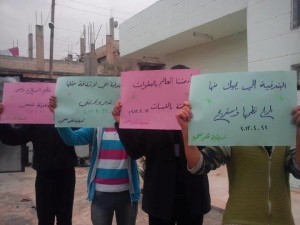Activists Seek to Rein In Free Syrian Army Abuses

A video uploaded to YouTube (WARNING – scenes of graphic violence) shows opposition fighters shouting “Allahu Akbar” as a number of prisoners lying on the ground try to convince them of their innocence one last time. A few minutes later, a barrage of gunfire drowns out all other sound, and the camera scans back over the prisoners’ lifeless bodies.

This scene is just one of many that testify to the fierceness of the war raging in Syria, which has seen human rights violations by both sides. Last week, United Nations investigator Carla Del Ponte announced her team has collected evidence of regime forces committing five massacres between mid-July 2012 and mid-January 2013, while opposition forces committed two over in the same period.
Some elements of the Free Syrian Army, FSA, support such practices as vindication for their own lost comrades, as evident from many of the comments under such videos as the one described above, in which commentators urge the killing of regular Syria army soldiers and “shabiha”. But civil society activists, civilians and some fighters see these violations as detrimental to the revolution, and have started working to combat what they see as inhumane practices.
A group called “Waw Al Wasl” recently printed brochures targeting FSA fighters, describing them first as “heroes of Syria and its free people” before going on to explain the rules of combat. This booklet emphasizes the importance of treating prisoners well and avoiding targeting civilians, as well as refraining from the excessive use of force. The pamphlet cites passages from the Quran and the Bible, along with quotes from civil rights icons such as Mahatma Ghandi and Martin Luther King. The pamphlet was distributed to fighters in areas of Idlib and Aleppo and Damascus that are controlled by the FSA.
“We want to speak to young fighters in their own language,” says a volunteer who declined to be named. “We respect their beliefs, whether they are FSA or Islamists.”
The activists who distributed the pamphlets recalled different reactions from the fighters, some of whom made fun of the peace activists for “theorizing”, while others welcomed the idea and expressed support for it.
The Centre for Civil Society and Democracy in Syria launched a similar initiative, publishing on its webpage a guide explaining the need for merciful practices on the battlefield. The Center also organized meetings on transitional justice with the leaders of FSA battalions in Aleppo, Idlib and the Jabal Al Akrad in the province of Latakia.
“Most of the leaders and people we met with had no idea about transitional justice, but they were open to it. Others rejected us because we’re not from their areas,” said Rinas, one of the project coordinators.
The Center is also seeking to establish independent civil administration councils in areas under FSA control.
“We have one basic principle: Communities will not evolve under military rule,” said Rinas. “Civilians are afraid; society is still governed by military figures who control all aspects of everyday life, even [humanitarian] relief.”
Activists organized several demonstrations in the areas under FSA control in Aleppo and Saraqib in the province Idlib, to denounce abuses committed by opposition fighters, leading to clashes between insurgents and civilian protesters.
On Friday, February 22, the Local Coordination Committees organized demonstrations throughout Syria calling for the FSA to organize its arms and fighters, while emphasizing the positive and important role played by the armed opposition. Marchers held banners bearing slogans such as “we amazed the world with our heroism, let’s amaze them with our [fair] practices” and “the rifle that has no culture behind it doesn’t build; it destroys.”
Media activist Ahmed Kaddour from Saraqib participated in one such demonstration in January that called for an end to human rights violations by the FSA.
Kaddour explained that he does not object to the presence of security bodies loyal to the armed opposition, only to some of their practices, such as enacting security measures without going to a court or civilian committee. He also emphasized that this movement is ready to face any authority that abuses its power.
“That demonstration was not a one-off event,” he said. “It represents a larger movement. No one will ever silence us again after we screamed in the face of [Syrian President Bashar] al-Assad.”
